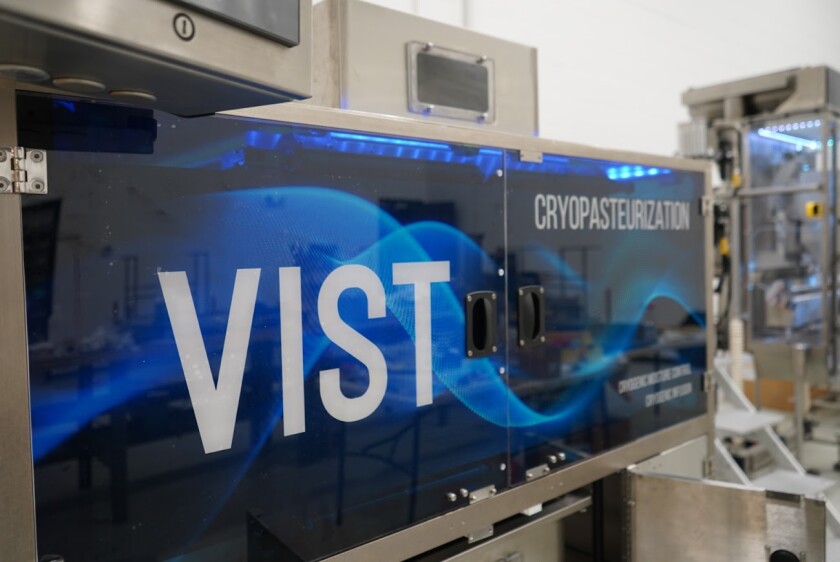Cannabis enthusiasts may not realize they celebrate their biggest holiday of the year — April 20 — on the anniversary of the first successful test of pasteurization, done by Louis Pasteur in 1862. They also may not be aware of how cannabis is cleaned and processed before hitting the dispensary shelf.
CryoPasteurization is a form of pasteurization for cannabis conducted by VIST Labs, which currently operates in Canada and the United States but is looking to expand into Europe. The company currently operates in Oregon, Colorado, Michigan, New York and soon to be Florida, Arizona and California.
"You wouldn't think that cannabis is dirty, but it's actually as dirty as raw milk," said Jim Sanfilippo, co-founder and CEO of VIST Labs. "Your dairy farmers have one thing very much in common with cannabis — it's a very susceptible product, it's fairly high water activity, and it gets attacked by yeast, mold, aerobic bacteria and it degredates very quickly."
The process of CryoPasteurization involves using cryogenic vapors which Sanfilippo called "medical grade water" combined with liquid nitrogen, which boils to become a medical grade sterilant.
"And that's the sterilant we use for cryogenic pasteurization," Sanfilippo said. "We do the pasteurization sequence at zero oxygen, using this cryogenic vapor, and we're able to pretty much get sterility with our system, in about 10 minutes per cycle, and roughly about 5 pounds per cycle."
ADVERTISEMENT

That's a "very high" output system for the industry, he said, and one that is also natural, using a gas that comprises 78% of the atmosphere that we breathe.
Contaminants in cannabis
There are over 50 different pathogenic organisms that can grow in cannabis, Sanfilippo said, including Aspergillus. There are approximately 180 species of Aspergillus, according to the CDC, but fewer than 40 of them are known to cause infections in humans.
"(Aspergillus) is a big problem in the ag industry, and in the nut industry and the grain industry," Sanfilippo said.
He said that mold and fungi species grow "exponentially" on cannabis at room temperature unless it's packed in a very low oxygen atmosphere. That growth continues through the shelf life of the product, Sanfilippo said.
"And it degradates the flavor profile, the cannabinoids, the terpenes, and continues to spoil the product in about 90 days, which is what I assess the shelf life to be on cannabis that's not pasteurized and packaged in a very low oxygen atmosphere," he said.
Sanfilippo said that pasteurization is really needed in the U.S. cannabis industry, but it's not required.
"Unfortunately, only about half of the states have pasteurization standards," he said. "So about half of the other states really don't have a good mechanism for kill-step in the process."
The state of Minnesota requires that manufacturers of cannabis products submit samples of each batch of a product to an accredited laboratory for testing.
ADVERTISEMENT
"Testing must be consistent with generally accepted industry standards for herbal and botanical substances, and, at a minimum, the testing must confirm that the product: contains the amount or percentage of cannabinoids that is stated on the label of the product; does not contain more than trace amounts of any mold, residual solvents or other catalysts, pesticides, fertilizers, or heavy metals; and does not contain more than 0.3% of any tetrahydrocannabinol."
Sanfilippo said he believes there should be federal unified regulatory guidelines to take care of public health risk for cannabis contaminants. He said the U.S. should be looking to Europe for direction.
"Europe is not going down the agriculture path with cannabis, they're going down the medical pharmaceutical path, and they're imposing European Pharmacopoeia standards on cannabis," he said. "It has to be sterilized to under 20 organisms per gram."
He said to put it in comparison, states like California, Oregon, Washington and Arizona have no quantitative testing limits for cannabis.
"We regularly test cannabis on dispensary shelves in the neighborhood of 200,000 to over a million colony-forming units in California and Oregon dispensaries," he said. "That's pretty shocking, especially considering the group of organisms that grow on the product."












